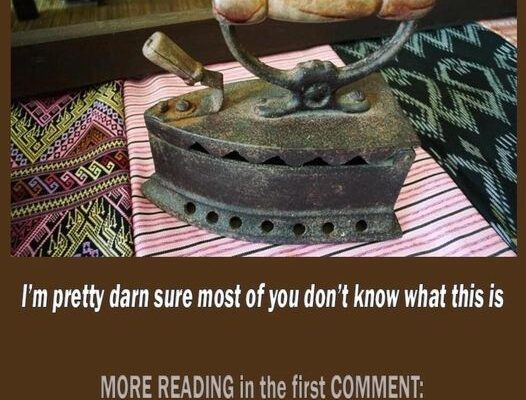Most of you probably have no idea what this is…
In fact, the following is an updated version of the article that keeps the original meaning while adding additional information:
It’s likely that the first thing you thought upon seeing it was, “Yes, that’s an iron.” However, have you ever pondered how these irons heated up and ironed clothes using coal? Welcoming to the charcoal iron world.
The development of a common household item, the iron, was motivated by the need for a painstakingly immaculate appearance. While electric irons have already proven popular as a quick and convenient way to assure wrinkle-free clothing, it’s exciting to go back and get to know a less well-known ancestor—the charcoal iron.

The term “charcoal iron” hints at its operation, as it uses charcoal as a heat source during the ironing process. These devices occupy an intriguing position in the annals of household inventions, a relic of which survives despite the passage of time.
The charcoal iron holds a unique and vital place in the annals of domestic history, representing an era when household tasks were completed with resourcefulness and inventiveness.
Before the introduction of cutting-edge electric irons, these ironing instruments, lit by charcoal combustion, were essential in preserving crisply pressed garments.
This exhibition will delve into the enthralling tapestry of charcoal irons, uncovering their historical significance and inner workings while investigating their impact on homes and subsequent evolution in reaction to technological progress.
Making Breakthroughs in the Ironing Industry:
Before introducing the charcoal iron onto the scene, people relied on various ways to smooth out their garments, including using flat, heavy objects heated over open flames.
However, the invention of the charcoal iron was a watershed moment in ironing technology. These cast iron irons were cleverly designed to accommodate a receptacle for burning charcoal, providing a more uniform and effective heat source.
Charcoal Iron Mechanical Intricacies:
The creation of charcoal irons, which harnessed the thermal energy from charcoal combustion, was brilliant.
Space was skillfully allocated within the iron’s hollow boundaries to insert burning charcoal bits, from which a continuous and regulated warmth would be emitted to the steel soleplate.
To begin the procedure, the user would unlatch the grate that covered the chamber, insert the charcoal, and then start ironing. The handle, primarily wood, stayed cool enough to be grasped even in use.
Influence on Domestic Life: Incorporating charcoal irons had a revolutionary effect on home tasks and pressing quality. The following sections look at how they left an indelible mark:
Improved Efficiency: Charcoal irons provided an unwavering and dependable heat supply compared to their predecessors. As a result, ironing periods were shortened and more efficient.
Optimized Pressing Results: Smoldering charcoal’s constant warmth made it possible to flatten materials more smoothly and consistently, which helped produce perfectly pressed clothes.
Global Adoption: Charcoal irons quickly became a staple in homes worldwide, marking a watershed moment in the evolution of ironing technology.
Mitigated Physical Strain: Unlike previous methods that required repeated reheating, charcoal irons reduced the physical exertion associated with ironing.
Transformation into Modern Electric Irons:
Although charcoal irons represented a significant leap over previous procedures, they still required care in maintenance and operation. As the wheels of innovation continued to revolve, the introduction of electric irons in the early twentieth century sparked a fresh revolution in the field of ironing.
Electric irons eliminate the need for charcoal by providing a simple and immediate heat source, making ironing even more accessible and efficient.
Keeping a Piece of the Past Safe:
Charcoal irons are now used as relics, providing tangible gateways to ancient ages and reminding us of our forefathers’ inventiveness.
Collectors and enthusiasts value these artifacts for their practical utility in historical reenactments or exhibitions, and for the stories they tell about Victorian home life.
The charcoal iron, a vital tool in the history of domestic tasks, encompasses a chapter of ingenuity and adaptability. Its progression from old approaches to more complex technologies exemplifies humanity’s never-ending search for efficiency and advancement.
While electric irons have long since overtaken their charcoal counterparts, the history of charcoal irons lives on as a tribute to the inventiveness and persistence of individuals who relied on them to keep their clothing clean and crisply pressed.



